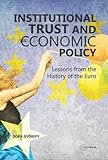Institutional trust and economic policy Lessons from the history of the Euro : Lessons from the history of the Euro / Dóra Győrffy.
Material type: TextPublisher: Budapest ; New York : Central European University Press, [2022]Copyright date: ©2013Description: 1 online resource (238 p.)Content type:
TextPublisher: Budapest ; New York : Central European University Press, [2022]Copyright date: ©2013Description: 1 online resource (238 p.)Content type: - 9786155225345
- 338.5019 23
- online - DeGruyter
| Item type | Current library | Call number | URL | Status | Notes | Barcode | |
|---|---|---|---|---|---|---|---|
 eBook
eBook
|
Biblioteca "Angelicum" Pont. Univ. S.Tommaso d'Aquino Nuvola online | online - DeGruyter (Browse shelf(Opens below)) | Online access | Not for loan (Accesso limitato) | Accesso per gli utenti autorizzati / Access for authorized users | (dgr)9786155225345 |
Browsing Biblioteca "Angelicum" Pont. Univ. S.Tommaso d'Aquino shelves, Shelving location: Nuvola online Close shelf browser (Hides shelf browser)
Frontmatter -- Contents -- List of Figures -- List of Tables -- Preface and Acknowledgments -- CHAPTER 1 Introduction -- CHAPTER 2 Institutional Trust and Individual Decision Making -- CHAPTER 3 Institutional Trust and Policymaking in the EMU -- CHAPTER 4 Fiscal Developments in the EU-15, 1992–2007 -- CHAPTER 5 The Maastricht Process in the CEE-10 -- CHAPTER 6 Financial Crisis in the EU-25 -- CHAPTER 7 The Relevance of Trust for Economic Outcomes -- Bibliography -- Index
restricted access online access with authorization star
http://purl.org/coar/access_right/c_16ec
The book seeks to link theoretical debates on the relevance of trust in economic outcomes with the current arguments about the origins and lessons of the subprime crisis. By what mechanisms does trust influence economic outcomes? Under what conditions do these mechanisms prevail? How do debates about trust help our understanding of the subprime crisis in the European Union? By integrating insights from Post-Keynesian, Austrian and new institutional economics, the central proposition of the analysis is that the presence or absence of institutional trust creates virtuous and vicious cycles in law-abiding, which critically influence the possibility for economic agents to have realistic long-term plans.
Mode of access: Internet via World Wide Web.
In English.
Description based on online resource; title from PDF title page (publisher's Web site, viewed 30. Aug 2022)









